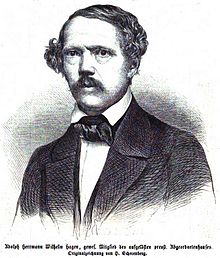Adolf Hermann Wilhelm Hagen
Adolf Hermann Wilhelm Hagen (born September 23, 1820 in Königsberg , † August 17, 1894 in Golling an der Salzach ) was a Prussian civil servant, banker and liberal politician. The "Hagen motion" that he introduced in the Prussian House of Representatives in 1862 triggered the end of the New Era in Prussia .
Life
Adolf Hagen was the son of Carl Heinrich Hagen , a lawyer and economist in Königsberg, nephew of Ernst August Hagen , first professor for aesthetics and art history at the Albertus University in Königsberg . The Königsberg polymath Karl Gottfried Hagen was his grandfather. Hagen studied law in Königsberg and entered the Prussian civil service in 1843. In 1854 he became city treasurer of Berlin and paid city councilor . He held this position until 1871. He then moved to the Deutsche Unionbank as a director and was involved in the establishment of several stock corporations during this time. After the bank was closed, he rejoined the Berlin magistrate as a city councilor in 1876.
Adolf Hermann Hagen was elected District Administrator of the Koenigsberg District in 1856 and Lord Mayor of Koenigsberg three times in the 1860s, but was unable to take office because of the government's refusal to confirm the elections. From 1862 to 1876 he was a member of the Prussian House of Representatives for the Progressive Party .
In 1862 he put a motion in plenary on the controversial issue of the military budget. The background was that the Progressive Party no longer wanted to support the reorganization of the military. He asked for the budget to be broken down into different items. The majority of the House of Representatives agreed. Finance Minister Robert von Patow saw this demand as basically justified, but interpreted it as parliamentary distrust. Since the government no longer had the unrestricted trust of Wilhelm I , the old liberal ministers resigned. The "Hagen motion" was thus a factor in the end of the politics of the New Era in Prussia and marked the beginning of the Prussian constitutional conflict .
From 1867 to 1877 Hagen was also a member of the Reichstag . Then he retired from political life. Because of his services to Berlin he received the honorary title of city elder in 1871 , combined with an honorary grave of the city of Berlin in the Dorotheenstädtischer Kirchhof on Chausseestrasse, Berlin.
Adolf Hagen was married to his cousin Johanna Louise Amalie Bessel (1826–1856), daughter of the Königsberg astronomer Friedrich Wilhelm Bessel (1784–1846), and his second marriage to Anna Claussen (1831–1905). He was the father of the physicist and director of the Physikalisch-Technische Reichsanstalt in Berlin Carl Ernst Bessel Hagen (1851–1923), the surgeon and director of the Charlottenburg-Westend municipal hospital Fritz Karl Bessel-Hagen (1856–1945) and Werner Hagen ( 1864–1921), Vice Consul in Yokohama, Consul in Philadelphia, Deputy Prussian Plenipotentiary to the Imperial Council.
Individual evidence
- ↑ a b Richard Vieweg: Hagen, Carl Ernst Bessel. In: New German Biography (NDB). Volume 7, Duncker & Humblot, Berlin 1966, ISBN 3-428-00188-5 , p. 471 ( digitized version ).
- ↑ Georg Hirth : German Parliament Almanach. 11th edition, Leipzig 1874, pp. 42–43.
-
^ Mann, Bernhard (edit.): Biographical manual for the Prussian House of Representatives. 1867-1918 . Collaboration with Martin Doerry , Cornelia Rauh and Thomas Kühne . Düsseldorf: Droste Verlag, 1988, p. 162 (handbooks on the history of parliamentarism and political parties: vol. 3); on the election results see Thomas Kühne
- Handbook of the elections to the Prussian House of Representatives 1867–1918. Election results, election alliances and election candidates (= handbooks on the history of parliamentarism and political parties. Volume 6). Droste, Düsseldorf 1994, ISBN 3-7700-5182-3 , pp. 391-395.
- ↑ Bärbel Holtz and Hartwin Spenkuch (eds.): Prussia's way into political modernity. Akademie Verlag, 2001, ISBN 3-05-003580-3 , p. 179 ( digitized version )
- ^ Fritz Specht, Paul Schwabe: The Reichstag elections from 1867 to 1903. Statistics of the Reichstag elections together with the programs of the parties and a list of the elected representatives. 2nd Edition. Carl Heymann Verlag, Berlin 1904, p. 23.
- ↑ Bernd Haunfelder , Klaus Erich Pollmann : Reichstag of the North German Confederation 1867-1870. Historical photographs and biographical handbook (= photo documents on the history of parliamentarism and political parties. Volume 2). Droste, Düsseldorf 1989, ISBN 3-7700-5151-3 , photo p. 149, short biography p. 410.
- ↑ Berlin-Brandenburg Academy of Sciences (ed.): Acta Borussica. New episode. 1st row. The minutes of the Prussian State Ministry 1817-1934 / 38. 2002, Hildesheim a. a.
Web links
- Biography of the Berlin State Library
- Hagen, Adolf Herrmann Wilhelm in the database of members of the Reichstag
- Biography of Adolf Hermann Wilhelm Hagen . In: Heinrich Best : database of the members of the Reichstag of the Empire 1867/71 to 1918 (Biorab - Kaiserreich)
| personal data | |
|---|---|
| SURNAME | Hagen, Adolf Hermann Wilhelm |
| ALTERNATIVE NAMES | Hagen, Adolf |
| BRIEF DESCRIPTION | German civil servant and politician (DFP), MdR |
| DATE OF BIRTH | September 23, 1820 |
| PLACE OF BIRTH | Koenigsberg |
| DATE OF DEATH | 17th August 1894 |
| Place of death | Golling on the Salzach |
